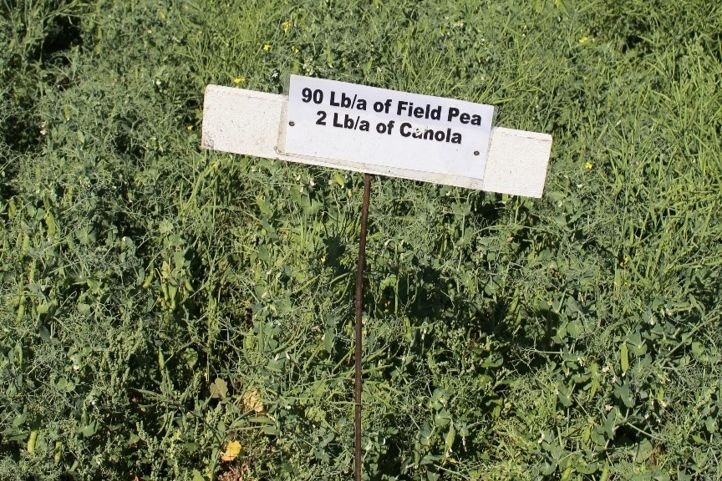Intercropping Research Shows Increased Efficiency and Favorable Returns

Research at the NDSU Williston Research Extension Center’s (WREC) Nesson Valley Irrigation Project site shows intercropping field peas and canola has positive effects on field pea lodging, increased canola yields, and when examined from an economic standpoint indicates positive returns.
Intercropping, the practice of growing two or more crops together in the same field, is not a new practice, but it has not been widely adopted, says Justin Jacobs, WREC irrigation research specialist.
“The idea of growing field pea and canola together, to then be separated as individual cash crops, is a relatively new and emerging idea,” Jacobs continues.
Field peas and canola are well-suited for intercropping research because they have similar maturities, are easily separated by varying seed size, utilize field peas’ natural trellising to reduce lodging and are compatible with western North Dakota’s semi-arid climate.
Now in their third year of research, Jacobs and a team of WREC researchers have planted four different ratios of field peas and canola together, applied varying rates of nitrogen and have subjected each trial to irrigation and non-irrigation protocols.
Among their findings: In the 2018 and 2019 trials, a reduction in the lodging of field peas was seen when intercropped with canola. Although significant differences were seen in yields of canola and field peas across fertilizer rates and planting ratios in the irrigated and non-irrigated trial, when an economic analysis was performed in 2019, the addition of canola into an intercropping production practice provided favorable net returns.
Jacobs notes that the economics are variable based on the year.
“Our goal is to conduct research that helps producers in this region of North Dakota stay profitable,” says Jerry Bergman, WREC director. “We believe our intercropping and other alternative cropping systems research will be beneficial to these producers.”
Jacobs and his research team also are conducting similar trials in 2020 and anticipate more data after harvest is complete. In addition, Clair Keene, WREC Extension cropping systems specialist, has ongoing research trials on intercropping chickpeas and flax under dryland conditions.
FOR MORE INFORMATION:
2020 WREC Field Day Intercropping Video
Justin Jacobs, 701-774-4315, justin.w.jacobs@ndsu.edu


